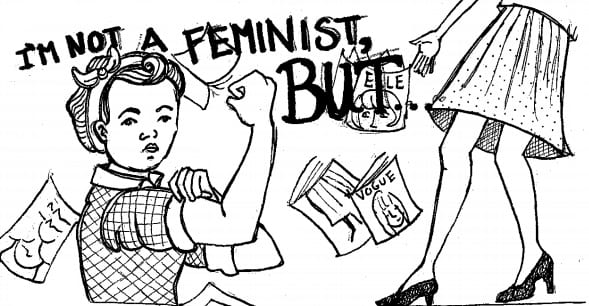
It has become a bit predictable: “I’m not a feminist, but I insert statement about men and women being equal.” Katy Perry and Taylor Swift have done it in the past year. On a more local level, St. Olaf students are lukewarm on the label, often sinking in their seats when a professor asks, “Who here identifies as a feminist?”
Yet, the evidence that we still need feminism is everywhere – from institutional dismissiveness of rape, to the wage gap, to the incessant objectification of women’s bodies. The argument that we live in a post-feminist society is as weak as that proposing a post-racial society. So what gives, then?
Well, feminism is having an identity crisis. Self-proclaimed feminists are very quick to tell you what it is not. Not bra-burning man-haters, not über-left-wing vegan Communists unless that’s your jam. Yet, when pressed to explain what it is, the stuttering begins. It’s about equality, sure. But equality isn’t a straightforward concept in a world where different kinds of women suffer from different degrees of oppression. Fact: A white, heterosexual, upper-middle-class, cis-gendered woman will lead a much more privileged existence than a queer or trans woman of color, regardless of the adversity she faces along the way.
As the feminist movement reorients itself to address the concerns of all women, it’s losing its focus and coherence. This isn’t an inherently bad thing, but it is incredibly confusing. You’ll notice that people who disavow the label “feminist” tend to do so without a working definition to guide their understanding. I understand how hard it is to sign up for something so ambiguous and so internally conflicted. In lay-woman’s terms, feminism is a hot mess right now.
But it’s more important than ever to embrace this hot mess, because collective action will always be more powerful than individual convictions. If you latch onto “the feminist movement,” you join a tradition and a community – one fraught with its own politics and hypocrisies, sure, but no ideology transcends human error. If you prefer to privately mull over your beliefs, exempt from the pressures of publicly identifying as a feminist, you forsake the opportunity to enter into something larger than yourself.
Look at the sweeping social movements of the past century, civil rights and LGBT rights. Would they have attained as much progress if people feared the stigma of a simple label? If they spent more energy qualifying their beliefs than proclaiming them?
Choosing feminism isn’t about your individual well-being. It’s about the women around you, the women you love. Maybe it will cost you something to start calling yourself a feminist. Maybe a guy you’re into will give you a weird look, or your great-aunt Sally will ask if you hate men now. But I would encourage you to think about what it could give to the Daisy Colemans and Malala Yousafzais of the world.
Abby Grosse ’15 grosse@stolaf.edu is from Shoreview, Minn. She majors in English.
Graphic Credit: ALLI LIVINGSTON/MANITOU MESSENGER

